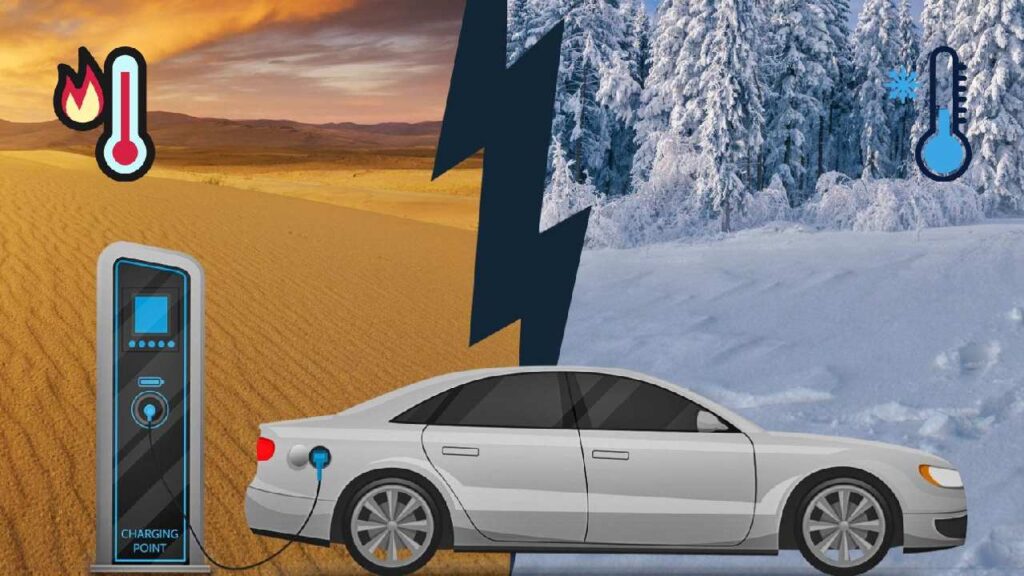There could be adverse effects of extreme hot and cold weather on EV batteries as Lithion-ion chemistry is temperature-dependent.
There are numerous handy tips and tricks to prevent the adverse effects of extreme hot and cold weather on EV batteries. Electric vehicles have emerged as a promising solution for sustainable and eco-friendly transportation. However, one aspect of EV ownership that often raises questions is the impact of extreme weather conditions on their batteries. In this blog, we’ll delve into how both extreme heat and cold can affect EV batteries. Understanding these effects can help EV owners take steps to maximize battery life and performance.
You might also like: New 3D Technology Claims To Make EV Batteries Safer
Effects of Extreme Heat on EV Batteries
Capacity Loss
One of the primary concerns with extreme heat is the accelerated degradation of an EV battery’s capacity. When exposed to high temperatures for prolonged periods, the battery’s ability to hold a charge diminishes more rapidly. This means that over time, your EV may experience a noticeable reduction in its driving range.
Reduced Lifespan
Heat also shortens the overall lifespan of an EV battery. While EV manufacturers design batteries to withstand a wide range of temperatures, excessive heat can lead to premature ageing. This may result in the need for battery replacement sooner than expected, which can be a significant expense.
Safety Concerns
Extreme heat poses safety risks for EV batteries. It can lead to a phenomenon known as thermal runaway, where the battery becomes extremely hot and potentially combustible. Manufacturers implement safety measures to mitigate these risks, but it’s crucial for EV owners to avoid exposing their vehicles to extreme heat whenever possible.
You might also like: Which is Better EV Battery Cooling System – Liquid or Air?

You might also like: Top 5 Tips To Save / Earn Money From EV Charging
Effects of Extreme Cold on EV Batteries
Reduced Range
In extremely cold weather, EV owners often notice a decrease in their vehicle’s driving range. The cold slows down the chemical reactions within the battery, reducing its efficiency. This means you’ll need to charge more frequently, especially during frigid winters, to cover the same distance.
Slower Charging
Charging an EV in very cold weather can be a slower process. The battery’s internal resistance increases in the cold, affecting the charging speed. EV owners may need to plan for longer charging times during winter months.
Battery Wear
While cold weather may not degrade the battery as quickly as extreme heat, it can still contribute to long-term wear and tear. Cold temperatures can increase the internal resistance of the battery, which may lead to gradual degradation over time.
You might also like: 5 New EV Battery Technologies – Aluminium-ion to Niobium
Mitigating the Effects of Hot & Cold Weather on EV Batteries
Thermal Management Systems
Many modern EVs come equipped with thermal management systems designed to regulate the temperature of the battery. These systems help maintain the battery within an optimal temperature range, mitigating the effects of extreme weather.
Pre-Conditioning
To counteract the impact of extreme temperatures, some EVs offer pre-conditioning features. This allows owners to warm up or cool down the battery before setting out on a journey. Pre-conditioning helps improve range and charging efficiency.
Manufacturer Guidelines
Following the manufacturer’s guidelines for operating your EV in extreme conditions is essential. They often provide recommendations for maintaining the battery’s health and performance in various weather scenarios.
You might also like: Top Solid-State Battery Companies For EVs
Learn Electric Cars Says
Extreme weather conditions, whether scorching hot or freezing cold, can affect the performance and lifespan of EV batteries. Heat can lead to capacity loss, reduced battery lifespan, and safety concerns, while cold weather can result in reduced range, slower charging, and gradual battery wear.
However, with proper precautions, such as using thermal management systems, pre-conditioning, and following manufacturer guidelines, EV owners can mitigate these effects and enjoy their eco-friendly vehicles year-round. Understanding how weather affects EV batteries is the first step toward maximizing their efficiency and longevity, making electric vehicles a reliable and sustainable choice for transportation, regardless of the climate.


Pingback: How Are EREVs Different From BEVs, PHEVs or HEVs?
Pingback: Could Dongfeng M-Hero 917 Be Perfect Rival to Hummer EV?
Pingback: Best Methods & Challenges of Recycling Electric Vehicle Batteries
Pingback: One day Phi Phi islands Trip from Phuket
Pingback: lucabet88
Pingback: ต่อผมแท้
Pingback: ราคาบอลสเต็ป
Pingback: rent boat in fort lauderdale
Pingback: สล็อตทำเงิน 2023
Pingback: อินเตอร์เน็ตบ้านทรู
Pingback: บาคาร่าเกาหลี
Pingback: poker
Pingback: pgslot168
Pingback: สล็อตเว็บตรง ใช้ทุนเล่นกี่บาทถึงจะได้เงิน
Pingback: chat rooms
Pingback: 789bet
Pingback: ระบบสมาชิก
Pingback: fun88
Pingback: ขายของออนไลน์
Pingback: Sharon
Pingback: Gregory
Pingback: ชุดกระชับสัดส่วน
Pingback: Fulfillment
Pingback: kasyno na prawdziwe pieniądze